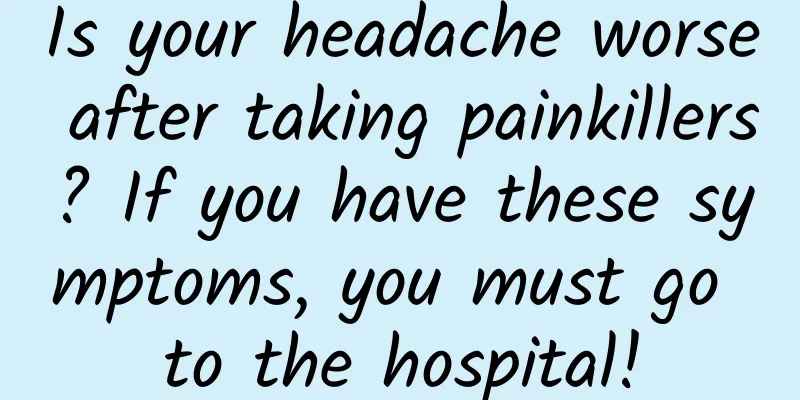Is your headache worse after taking painkillers? If you have these symptoms, you must go to the hospital!

|
Review expert: Peng Guoqiu, deputy chief physician of the Fourth Medical Center of the General Hospital of the Chinese People's Liberation Army We all have headaches in our lives. Being blown by cold wind, not getting enough rest, or catching a cold can all cause headaches. When a headache strikes, most people either endure it and it will go away, or take painkillers to relieve it. Taking painkillers occasionally may not have much effect, but can effectively relieve headaches. However, if you take painkillers excessively for a long time, it will not only fail to relieve the headache, but will also make it worse! Headache Headache in a broad sense refers to all pains in the head, while headache in a narrow sense refers to pain limited to the upper part of the head, including pain above the line connecting the brow arch, the upper edge of the auricle, and the external occipital protuberance. Headache is one of the most common symptoms of the nervous system. Headache – Medication Overdose Headache Medically, headaches are classified according to the different causes that cause them: 1. Primary headaches: migraine, tension headache and cluster headache; 2. Secondary headache: headache caused by diseases such as meningitis, brain tumor, cerebral ischemia or cerebral hemorrhage, fever, and headache caused by drug overuse. Headaches can be divided into two categories based on their onset characteristics: Chronic headache: more than 15 headache days per month. Today, we are talking about "medication overdose headache" Aunt Jia has been suffering from headaches for more than 10 years. In recent years, her headaches have become more and more severe. Because the pain is unbearable, Aunt Jia can only rely on painkillers every day to relieve it. After taking it for a long time, she began to feel that painkillers were useless. If she didn't take it, she would still feel pain. She could only increase the dosage and keep taking it. In order to deal with the headaches that may occur at any time, she even put painkillers in her pocket when she went out. Aunt Jia also knew that she couldn't take painkillers like this anymore, but the pain when the headache came made her dare not stop taking the medicine... Later, Aunt Jia went to a headache clinic. After an examination, the doctor said that the instructions for the painkillers she took stated that she could only take them three times a day. She had already taken an overdose, and the drugs contained caffeine. If such drugs were taken frequently and for a long time, they would cause headaches after drug overdose. Excessive use of painkillers may also cause damage to other parts of the body, such as the gastrointestinal tract, kidneys, and cardiovascular system. Medication overdose headache Aunt Jia suffers from medication overuse headache, which refers to frequent headaches after long-term overuse of analgesics. MOH is a global health problem that causes severe disability and impaired quality of life for patients. Some patients have poor treatment effects and high relapse rates, which brings huge burdens to individuals and society. In 2013, the MCIHS defined MOH as a condition in which a patient has primary headache and regularly takes one or more symptomatic analgesic drugs for more than 10 or 15 days per month (depending on the type of drug used) for more than 3 consecutive months. For simple analgesics, the number of days per month is greater than or equal to 15 days. Do not take any medication on your own, seek medical attention immediately if you have these symptoms! Taking painkillers on your own can easily mask the symptoms of the disease itself. In addition to mood swings and lack of sleep, headaches can also be caused by eye diseases, otitis media, sinusitis, acute infections, vitamin A poisoning, infectious diseases, and brain diseases. If you have frequent headaches but only take painkillers, it is easy to delay the diagnosis and treatment of the disease. These 3 types of headaches should be treated promptly: 1. If you often have unilateral or all-over headaches in the early morning or at night, and the headaches continue to worsen, this indicates that the headaches may be caused by brain diseases, and there is even a risk of brain tumors. 2. If you have a sudden severe headache, you must seek medical attention immediately, especially if you have underlying diseases such as hypertension and diabetes. Headache is accompanied by other symptoms, such as fever, blurred vision, projectile vomiting, or confusion. |
<<: A new breakthrough in supersonic flight! Will “Somersault Cloud” open a new era of aviation?
>>: Deep-sea hydrothermal vents, water-storing craters...where is our "cradle"?
Recommend
The brightest "cosmic fireworks show" to date has been fully recorded and selected as one of the top ten scientific advances of the year. What does this achievement of "Lasso" tell us?
On February 29, 2024, the National Natural Scienc...
Ideal ONE overturned a motorcycle due to a broken axle, and the official accused it of being a rumor. The person involved responded that it was indeed man-made.
On February 4, Ideal Auto officially announced th...
Sun Jingwei's secret body sculpture: Recreating the vest line
Sun Jingwei's secret body sculpture: Recreati...
It is nonsense to say that the color TV industry is going to die out during the difficult transformation period
Recently, the news that some Japanese companies h...
2022 Brand Online Marketing Traffic Observation
Looking back at 2021, the boundaries between e-co...
How to quickly build a marketing and promotion system for B2B products?
In the past two years, the SAAS product market ha...
How to build user churn warning?
Before a user becomes a churned user, the risk of...
Brake failure and reduced driving range led to 20 BYD electric buses being returned and orders canceled by the US
According to foreign media reports, a batch of BY...
Based on 800 million massive data, here are 5 tips to increase the click-through rate of news messages
The China Internet Network Information Center (CN...
The domineering "little trumpet": The beautiful morning glory is actually a "foreigner"?
Speaking of invasive alien species, the most well...
How does a new website build its own keyword library?
Having worked on websites for many years, I attac...
What does 520 mean? Can 5.20 red envelopes be sent out casually?
What does 520 mean? Can 5.20 red envelopes be sen...
Make way for the super ferocious big cat!
Recently, a man found a black animal This animal ...
How does Tongcheng operate blind boxes that are popular all over the Internet?
Tongcheng Travel spent only 9 yuan to buy the rea...









